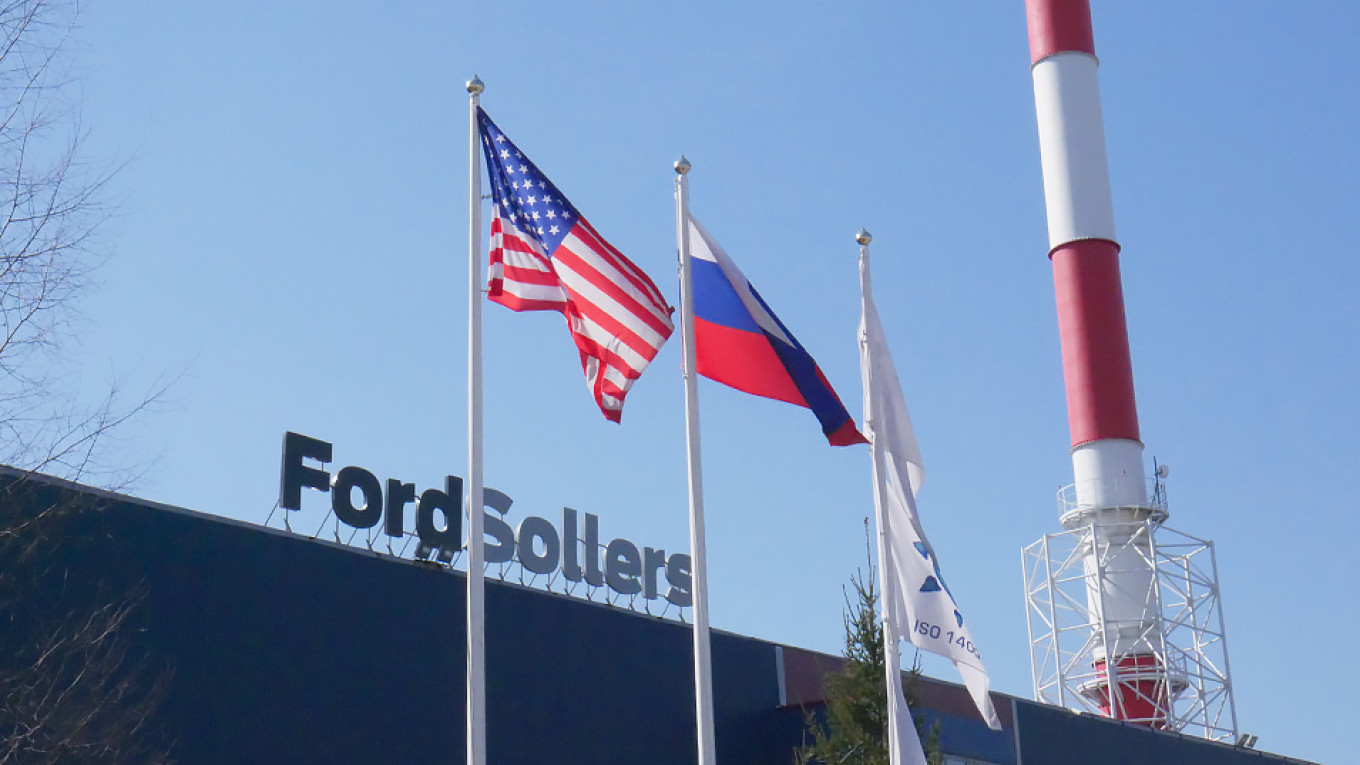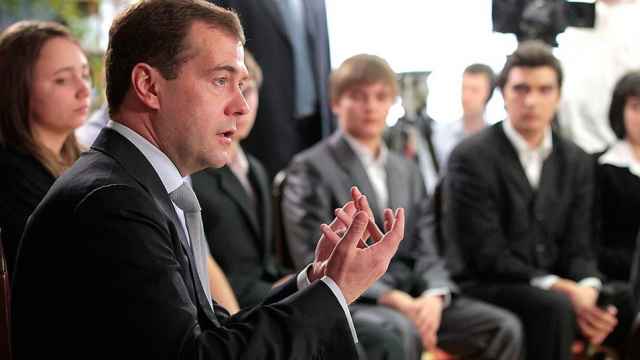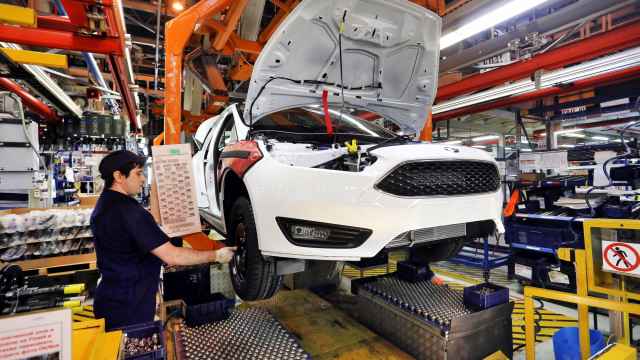VSEVOLOZHSK, Leningrad region — When Ivan first learned he would be losing his job at the Ford factory he was floored. For more than a decade, the 50-year-old welder has been producing the frames of Focus and Mondeo cars at the U.S. automaker’s plant in Vsevolozhsk, an industrial town 30 kilometers east of St. Petersburg.
“I’ve been working at this factory for the past 13 years, so I don’t have any experience with jumping from job to job,” Ivan said on a recent spring morning, as he and hundreds of his colleagues packed Vsevolozhsk’s town hall for a meeting with government officials about their future.
The cars made at the factory took the Russian market by storm when it first opened in 2002, as the country’s burgeoning middle class snapped up the American brand’s vehicles as a sign of its new affluence.
But Russia’s economic downturn since 2014, coupled with the effects of Western economic sanctions following the annexation of Crimea, have hit the automobile industry and Ford hard, cutting sales of cars in the country by more than half.
After years of losses, Ford announced late last month that it would cease production of all passenger cars in Russia, citing “inadequate returns on invested capital.”
Ivan, along with more than 900 of his colleagues, will be fired by June and the Vsevolozhsk plant will be shut for good.
The workers will now face the daunting task of looking for employment in a region where most vacancies advertise salaries of just 25,000 rubles ($390) per month — half the average wage at Ford and hardly enough to meet living costs.
“I don’t know what I’m going to do now; I expected to continue working,” Ivan said, holding up a sign outside the town hall calling for “fair compensation.”
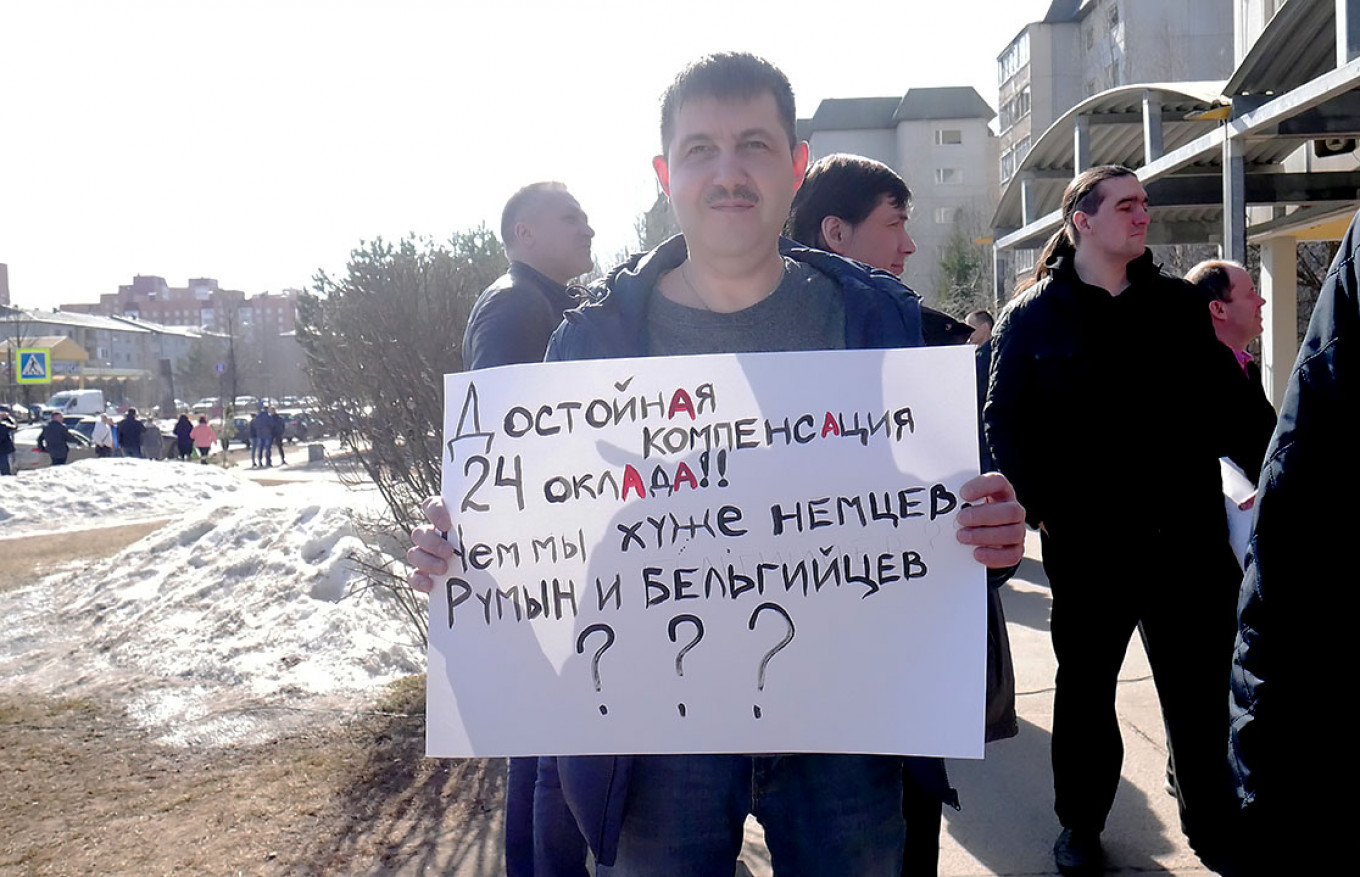
Ford Sollers, the joint venture that has operated the Vsevolozhsk plant since 2011, has offered the workers severance packages equal to up to 12 months’ salary.
But that’s not cutting it with the factory’s union, The Ford Primary Trade Union Organization, which counts nearly half of the workers as members.
Citing the severance packages the automaker has paid to its workers at other shuttered factories around the world, the union has demanded compensation equal to two years’ salary.
“Ford always told us we were part of a global team and that we would be treated equally, no matter where we were based in the world. But in practice, we’re being treated as if we were from different classes,” said Mikhail Sergeyev, the leader of the union.
Why are we being treated worse than the Romanians, the Germans and the Belgians?
“Why are we being treated worse than the Romanians, the Germans and the Belgians?”
If Ford meets the demands, it won’t be the union’s first success.
Founded as a consequence of the global corporation’s presence in Russia, it organized a series of successful strikes to achieve what observers said was the best collective bargaining agreement in Russia’s automotive industry in 2007. Since then, the union has been a standard bearer for Russia’s labor movement, and has gone on to help workers organize at over a dozen other factories in the country.
This time, it has organized demonstrations, pickets, and a work-to-rule, threatening to grind production at the Vsevolozhsk factory to a halt if its demands are not met in the months before it finally closes.
From boom to bust
Before its fortunes turned, Ford was held up as a shining example of a foreign corporation that had successfully adapted to the Russian market in the Putin era.
The American automaker ramped up production of its passenger cars in the country after opening in Vsevolozhsk, driven by high demand. The Ford Focus became Russia’s best-selling foreign car between 2006 and 2008, with months-long waiting lists.
Economists predicted that Russia would overtake Germany as Europe’s top car market, and Ford Sollers added two plants in Tatarstan, investing hundreds of millions of dollars and forecasting production would increase to 300,000 cars per year.
But Russia’s economic downturn caused sales of Ford cars to plummet 70 percent from a peak of over 130,000 in 2012. In recent years, sales have only slightly recovered — to 53,234 in 2018, according to the Moscow-based Association of European Business.
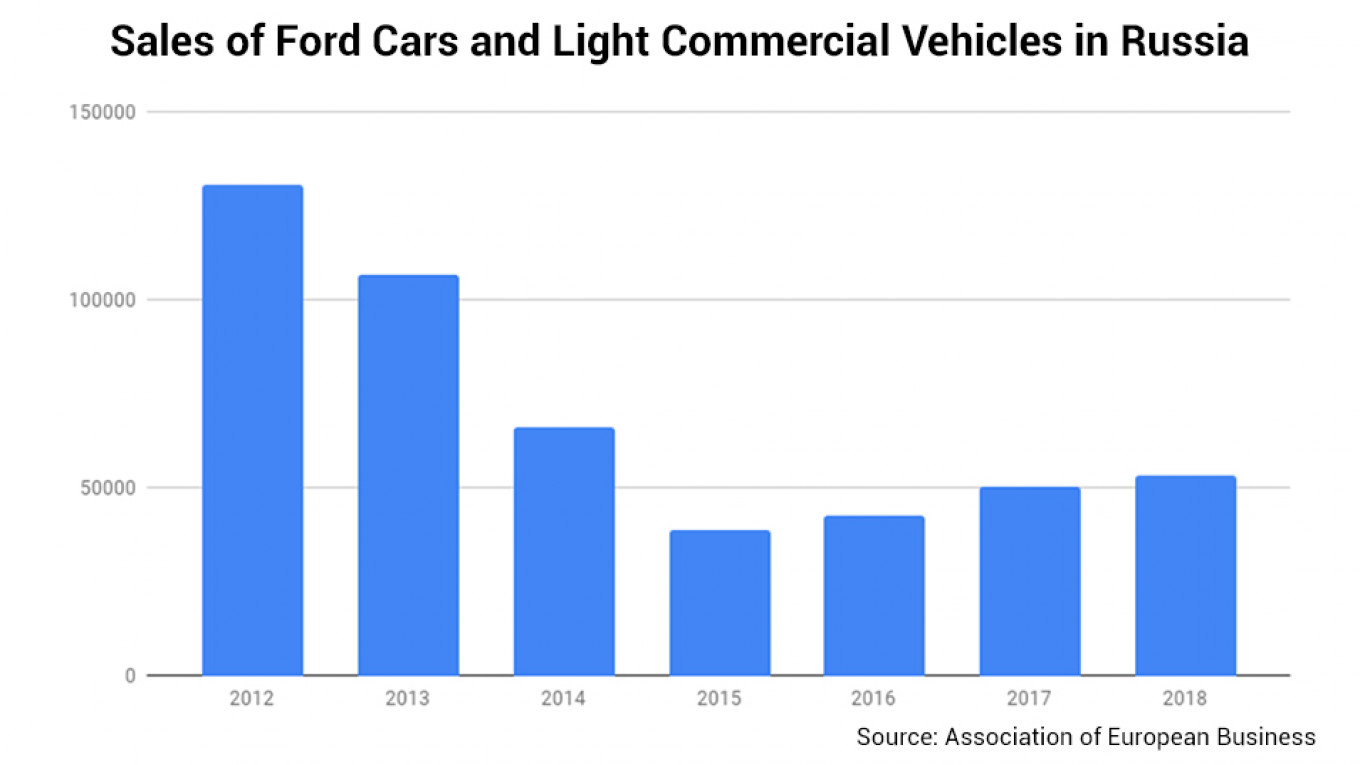
“After 2013, there was a drastic drop in the automobile market in Russia and Ford was unable to find a niche that would have allowed it to sustain the production capacity of its three factories,” said Vladimir Bespalov, an analyst at VTB Capital.
While Ford has posted losses in other parts of the world, analysts say the problems it faced in Russia were unique.
The devaluation of the ruble in 2014 increased the cost of the imported parts that make up more than 60 percent of Ford’s vehicles, and sent car prices soaring.
“Their cars were relatively expensive for middle consumers, who had many other manufacturers to choose from, and they also weren’t able to break through into the premium segment,” Bespalov said.
The union at the Vsevolozhsk factory blames Ford’s Russian managers for failing to adjust to market conditions when the economic crisis hit, and dragging down the workers in the process.
“The missteps of the company’s management in marketing and sales have caused the drop in the production of Ford cars in Russia,” the Interregional ‘Workers’ Association’ Trade Union (MPRA), which was founded by activists from the Vsevolozhsk factory, said in a statement.
“Now these failures will affect the lives of people who worked in good faith to bring the company profits.”
‘What are we supposed to do?’
At the town hall meeting, the unionized workers carried placards and lists of questions about their severance, their retirement and their future.
“Many of us have children and we took out loans to pay for schools. What are we supposed to do now?” Andrei Glavdeyev, a man in his mid-forties who has worked at the factory since 2004, asked the assembled officials.
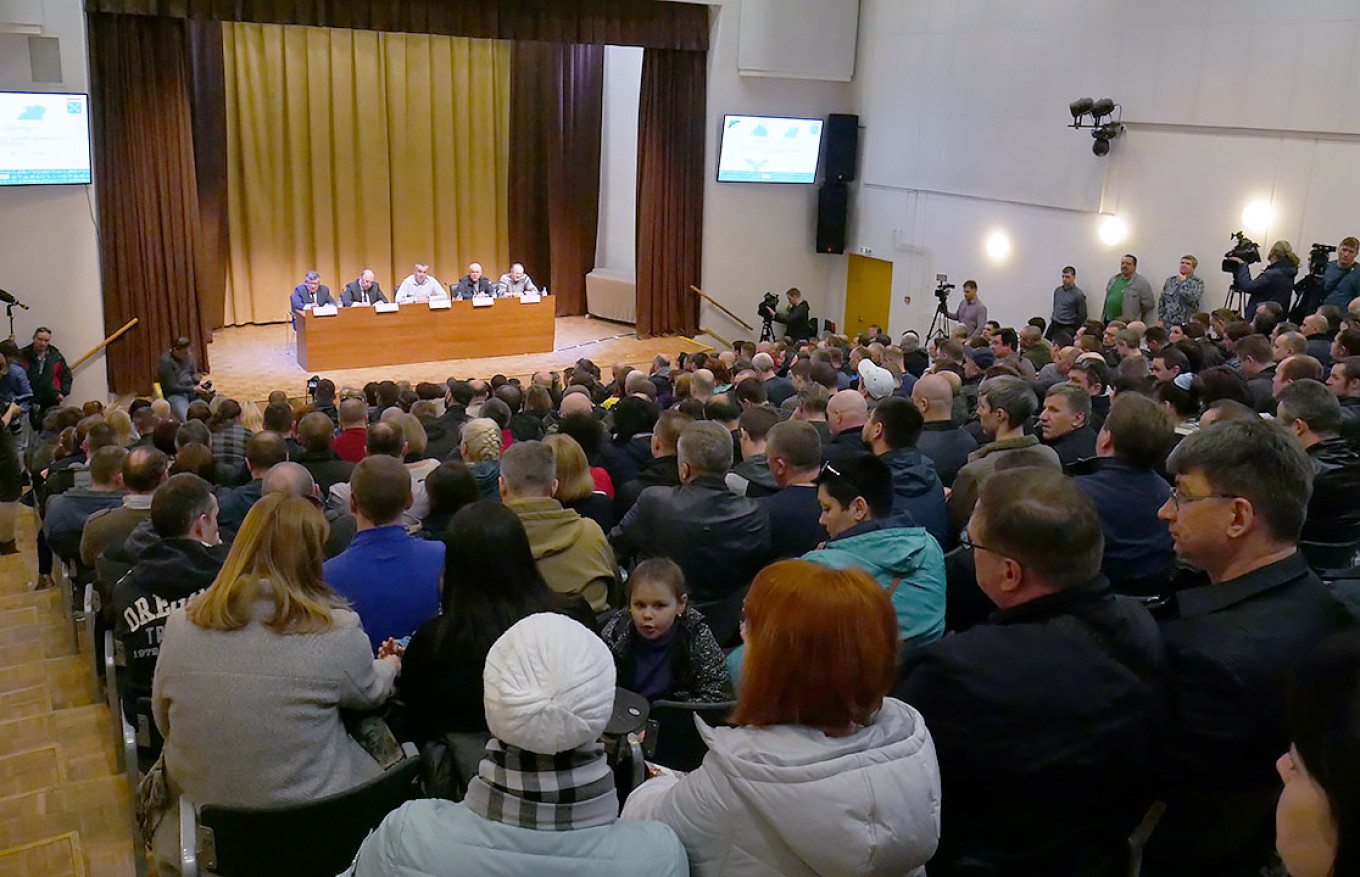
Some of the workers said they suffered from health problems because of their work at the factory. To make matters worse, older workers were pushed five years further from retirement when Russia’s government increased the legal pension age late last year to 65 years for men and 60 for women.
But they are most angry about the severance packages they say they are being forced to sign by Ford Sollers.
In its statement on the closure of the Vsevolozhsk factory, along with two other plants in the country, Ford Motor Company said it would allocate $200 million in cash in Russia “primarily attributable to separation and termination payments for employees and suppliers." Ford's only remaining plant in Russia will produce Transit light commercial vehicles.
But union leaders say that under the compensation plan proposed by Ford Sollers, only 3 percent of the money will make its way to the workers in severance.
“We know our Russian managers are doing everything to cut costs so they can ensure a bigger golden parachute for themselves,” said Alexei Etmanov, the leader of the union between 2005 and 2011 and currently the secretary of the MPRA.
“The more they squeeze out of the workers, the more they’ll have left to put in their pockets.”
A Ford Sollers press spokesperson told The Moscow Times that the amount the company is offering to the workers is significantly higher than the two months salary it is obliged to pay under Russian labor law. It’s also more than the seven months General Motors offered workers when it closed its plant outside St. Petersburg in 2015.
Why does Ford think they can get away with paying so little in Russia?
But Etmanov said the one year compensation offered by Ford Sollers only comes out to around 7,000 euros per worker. He points to the example of Ford workers in Germany, who were recently offered 30,000 euros in base compensation, in addition to several monthly salaries according to seniority.
“We know we’ll never be able to get the same compensation as workers in Germany, so we’re basing our demands on the figure that is equivalent to two years of salary, which comes out to 1 million rubles for most workers, which is only around 14,000 euros,” he said.
“Two years salary is an absolutely adequate sum to pay for people who have worked for up to 15 years developing the corporation in Russia, giving up so much of their health.”
“Why does Ford think they can get away with paying so little in Russia?”
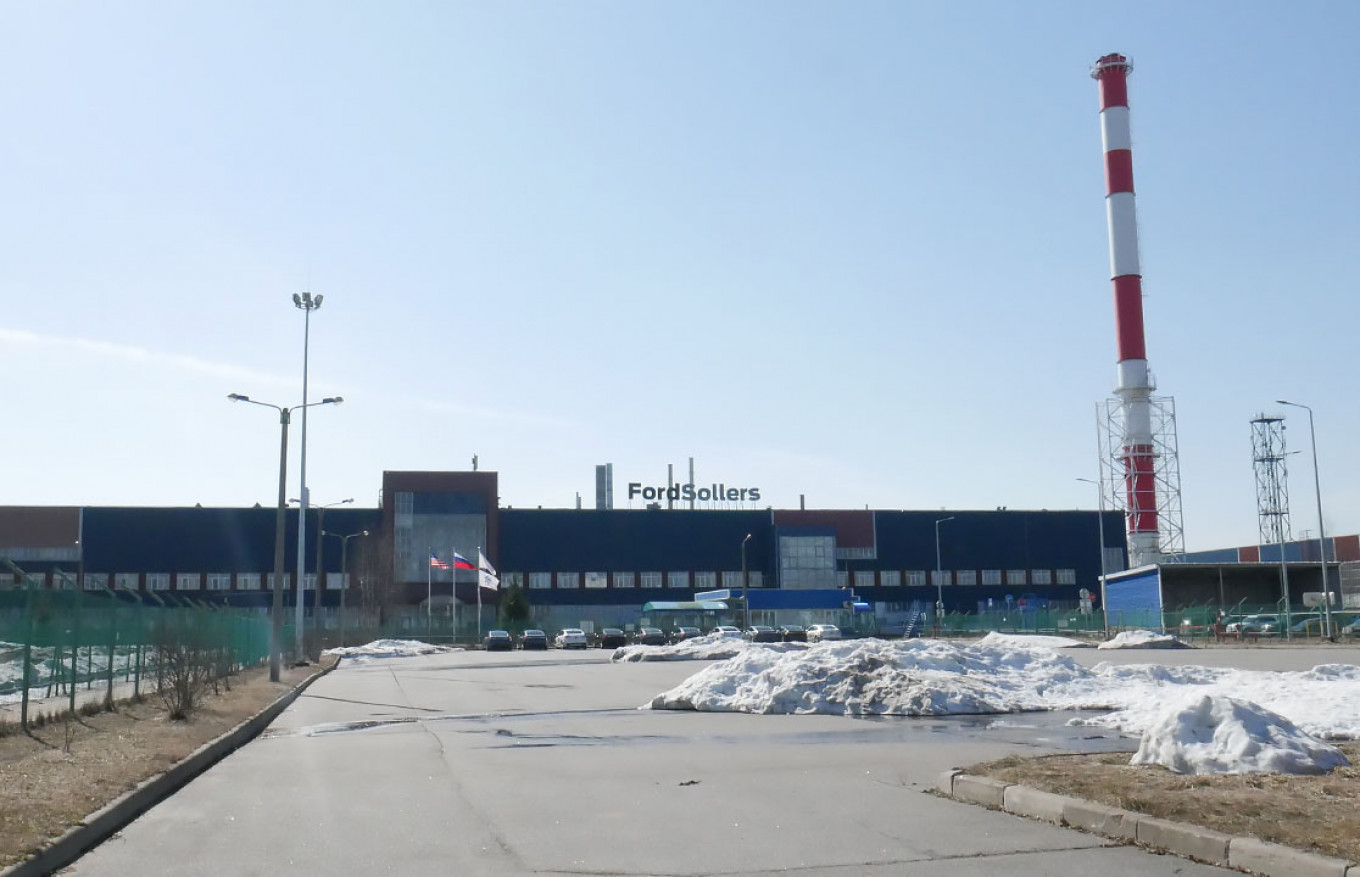
At the meeting in Vsevolozhsk, officials from the regional labor ministry promised the Ford workers that a special commission would be set up to help them find employment after the factory closes.
But the workers worry that their union past will detract possible employers.
Some, like Ivan, say they hope another investor will come along to buy the factory in Vsevelozhsk, allowing them to keep their jobs.
Many of the workers have already agreed to the severance packages offered by Ford Sollers, but others have vowed “to fight to the end.”
“Our success will depend on how firmly we defend our interests and how firmly we will stand for our demands for compensation,” Etmanov said.
“No one will help us. At the end of the day, it will depend on us, the Russian workers,” he added.
A Message from The Moscow Times:
Dear readers,
We are facing unprecedented challenges. Russia's Prosecutor General's Office has designated The Moscow Times as an "undesirable" organization, criminalizing our work and putting our staff at risk of prosecution. This follows our earlier unjust labeling as a "foreign agent."
These actions are direct attempts to silence independent journalism in Russia. The authorities claim our work "discredits the decisions of the Russian leadership." We see things differently: we strive to provide accurate, unbiased reporting on Russia.
We, the journalists of The Moscow Times, refuse to be silenced. But to continue our work, we need your help.
Your support, no matter how small, makes a world of difference. If you can, please support us monthly starting from just $2. It's quick to set up, and every contribution makes a significant impact.
By supporting The Moscow Times, you're defending open, independent journalism in the face of repression. Thank you for standing with us.
Remind me later.



